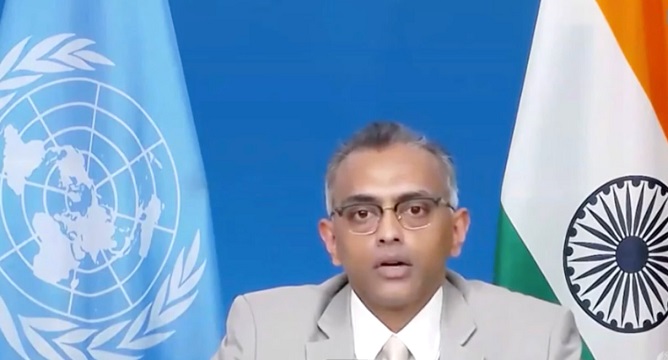Underlining the role of technology in the safety of UN peacekeepers, India has told the world body’s top organ that plans are afoot to launch a mobile tech platform in August this year that will provide terrain-related information to the Blue Helmets in the line of duty.
“Infusion of appropriate technology can play a significant role in improving the safety and security of the peacekeepers. Use of field-focused, reliable and cost-effective new technologies in peacekeeping operations that are driven by practical needs of end-users on the ground are the need of the hour,” India’s Deputy Permanent Representative to the UN, Ambassador K Nagaraj Naidu said on Monday.
Addressing the UN Security Council open debate on ‘United Nations peacekeeping operations: Improving safety and security of peacekeepers’, Naidu said India, in partnership with the UN Department of Peacekeeping Operations and the Department of Operational Support, has been working towards developing a mobile tech platform ‘UNITE AWARE’ that helps increase situational awareness and provides terrain-related information to peacekeepers.
“We have already contributed USD 1.64 million towards this project and hope to launch it during our August presidency later this year,” he said. India will be the President of the 15-nation UN Security Council in August this year.
India is one of the largest troop-contributing countries to UN peacekeeping missions and has contributed more than 250,000 troops in 49 missions over the years.
“Cumulatively, the largest from any country,” Naidu said, adding that India is “proud of its long and rich tradition” of contribution to the UN peacekeeping missions.
Naidu told the Council that an Indian peacekeepers brigade stationed in Goma, Democratic Republic of the Congo, is presently saving lives in the aftermath of the volcanic eruption of Mount Nyiragongo.
During the COVID-19 pandemic, India gifted 200,000 doses of COVID-19 vaccine for UN peacekeepers across all UN missions.
As of March 31 this year, there is 87,889 personnel serving in 12 peacekeeping operations around the world.
“We have also delivered 200,000 doses of COVID-19 vaccines for vaccinating all uniformed personnel deployed in various field missions and are pleased to note that close to 140,000 field personnel have already been vaccinated, Naidu told the Council.
During the pandemic, which posed severe challenges to peacekeeping missions and peacekeepers, India readily answered the Secretary General’s call by upgrading its hospitals in the UN Mission in South Sudan (UNMISS) and UN Organization Stabilization Mission in the Democratic Republic of the Congo (MONUSCO).
In a presidential statement, the Council underscored the “importance it places on the safety and security of peacekeepers on the ground and the need for troops and police-contributing countries to, ensure where appropriate, that all peacekeepers in the field are equipped, informed, and trained to mitigate the threat posed by landmines, explosive remnants of war and improvised explosive devices.”
It said the primary responsibility of the safety and security of United Nations personnel and assets rests with host states.
“In this regard, the Council condemns the violations of status-of-forces agreements by any party to those agreements, recognizes the grave risks such violations can present to the safety and security of peacekeepers.”
Naidu noted that UN peacekeepers operate in a complex security environment involving armed groups, non-state actors, and terrorists and the ever-expanding mandates of peacekeeping missions with limited resources have only added to the challenges and complexities that peacekeepers face on the ground.
He added that these challenges are compounded further by the increasing use of improvised explosive devices (IEDs) by terrorists and armed groups.
More than 260 peacekeepers have died due to malicious attacks since 2013.
It is evident that “protecting the protectors” should be the primary objective.
“The tendency of burdening peacekeepers with responsibilities, which ought to primarily lie with the host state or other relevant international organizations, should stop,” he said.
The Security Council needs to authorize carefully thought-out mandates to peacekeepers in close consultation with troop-contributing countries since the protection of peacekeepers is as important as the protection of civilians.
Peacekeeping missions cannot be a long-term response to what are fundamentally political problems.
It is for the Council to address these issues rather than burden peacekeeping missions beyond their mandate, he said. Under-Secretary-General for Peace Operations Jean-Pierre Lacroix told the Council that since January 1 this year 15 peacekeepers lost their lives due to malicious acts.
“One peacekeeper lost continues to be one too many,” he said, adding that “attacks against peacekeepers can constitute war crimes; are a huge impediment to the pursuit of peace; an added constraint for the effective implementation of UN Security Council mandate”.
Naidu stressed that besides taking preventive measures to improve the safety and security of peacekeepers, it is also imperative to bring the perpetrators who committed heinous crimes to justice.
“This needs collaboration and coordination between different stakeholders, including the UN and the host countries, where the peacekeepers are deployed and extending assistance to countries who need help to frame these legislations,” he said.
Naidu underlined that there should be concerted efforts to upgrade the security infrastructure of camps of UN peacekeepers as a number of casualties have been related to direct attacks on security camps.” Timely and reliable medical evacuation and casualty evacuation, including the use of helicopters with night flight capability and night retrieval operations, is essential,” he added.








